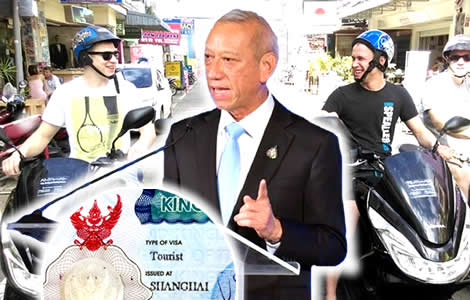Research conducted in Phuket has shown that European visitors to the paradise island spend more. Last year, they accounted for 17% of passengers but were responsible for 24% of the money spent within the kingdom’s heavily dependent tourist economy.
The latest moves by Thailand’s Tourism and Sports Minister, Phiphat Ratchakitprakarn, to reopen the kingdom include an emphasis on long-stay tourists. These moves will now include a visa that will allow ‘long stay’ tourists to Thailand to stay in the kingdom for up to 9 months with two renewals of an initial 90-day visa.

Thailand appears to be using the Covid 19 pandemic to test new concepts in tourism not only to deal with the current emergency but also, in the longer term, to move away from low expenditure per capita mass tourism which had already become a problem before this catastrophe.
In 2019, Thailand reached record levels of incoming tourists with over 38 million arrivals but questions were being raised, at the highest echelons, among economic experts and, at the grassroots, among an increasingly disgruntled Thai public.
It may look to the followers of Thailand outside the kingdom as, in many ways, a reversal of the previous government policy of penalising long-stay tourists. That’s because it is.
It may be the case that Thailand has discovered this market could be the key to building a new more successful tourism model.
Certainly, it is an answer to the tourism challenges in the post-Covid 19 world.
Tourism minister is changing the emphasis of Thailand’s tourism industry to target higher spenders
On Saturday, Minister of Tourism and Sports, Phiphat Ratchakitprakarn, expressed his support for long-stay tourism in Thailand as details emerged of a new visa which would apply to long-stay holidays booked with Thailand’s new tourism agency. Those approved would be granted an initial 90-day ‘long-stay’ visa to enter Thailand on an extended holiday including the full set of health requirements and a mandatory period in the alternative quarantine scheme.
The visa can be extended twice to stay on for a total of up to 270 days in Thailand or 9 months.
Mr Phiphat was speaking at an event in Samut Prakan in the presence of several foreign ambassadors and other invited guests from the travel trade and the media.
Special appeal to elderly visitors seeking the warmth of the sun and medical treatment in Thailand
The new tourist concept is particularly aimed at seniors from developed countries who wish to avail of Thailand’s unrivalled weather including warmth and sunshine all year round as well as its medical facilities which are very competitively priced compared to western countries.
The new scheme was explained by Dr Boon Vanasin of the Thonburi Healthcare Group, the third-largest operator of private hospitals in Thailand.
The medical professional said his company alone felt certain that up to 50,000 Europeans would travel willingly to Thailand for recuperative care, medical treatment and the weather in the coming winter if the regulatory regime, now being proposed, was in place.
Thailand’s richest man set out such a shift to an ‘oasis’ at the beginning of the virus emergency
It is understood that the basis for these new programmes may be the advice from senior Thai business people such as Mr Dhanin Chearavanont, the country’s richest man whose conglomerate employs hundreds of thousands in Thailand and other parts of Asia.
He has called, in recent months, for the government to make Thailand a more exclusive tourism offering.
Mr Dhanin has urged the government to open up the kingdom to tourism quickly but also to use the crisis as an opportunity to market Thailand as a sunny oasis for wealthy foreign visitors at a premium cost.
Success of the alternative quarantine scheme and the determination of foreigners living in Thailand to get home has impressed authorities
In addition to this, the success of the alternative quarantine scheme and the number of foreigners with links to Thailand, willing to pay large financial amounts simply to gain access to the kingdom, is leading some to rethink what Thailand’s approach to foreign tourism should be.
Even before the Covid 19 virus, in 2018, the World Bank had, in a detailed report, warned the Thai government that mass-market tourism was exhausting Thailand’s natural resources in key tourist hotspots while local populations were beginning to express frustration at the sheer numbers arriving on their doorstep, 25% of whom were from China.
European tourists particularly targeted by Phuket tourist concerns as they spend more
The tourism industry appears to be particularly open to inviting in European tourists as it revealed on Saturday that in 2019, while European visitors only made up 17% of passenger arrivals, they accounted for 24% of all foreign tourism expenditure or a significant ฿461 billion.
Phuket’s Tourist Association President, Bhummikitti Ruktaengam, has urged the government to open up Thailand to this group as a priority.
‘Phuket’s economy needs foreign demand to bounce back but we also have to balance infection risks and the economy,’ he said.
Mr Bhummikitti also played down the potential for domestic tourism in Phuket.
He explained that foreign visitors to the island accounted for over 66% of all tourists last year but represented over 90% of the island’s receipts.
Get all our latest stories, follow Thai Examiner on Facebook here
Further reading:
Broader opening of Thailand to tourists may be on but only with robust health controls says PM
Tourism is coming back to Phuket with a wave of visitors expected from October in a surprising move
Warning signs in new banking and employment reports as virus crisis hits Thailand’s bottom line hard
June export figures show a 23% decline on last year but the economy will recover by end of 2021
Prime Minister indicates that the cabinet reshuffle will be complete very shortly with no problem
Somkid ready to bow out of government as September cabinet reshuffle seems to be on the cards
Election of Prawit as Palang Pracharat leader will see more grassroots politics in government


















